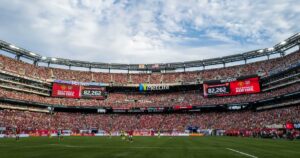 Queen Park Rangers have released their accounts for last season, and reading them is not for the faint of heart. QPR reported that for the year ending 31 May 2012, show that the club lost £23m due the fact that their wage bill almost doubled from £27.6m to £58.5m in their first year back in the Premier League.
Queen Park Rangers have released their accounts for last season, and reading them is not for the faint of heart. QPR reported that for the year ending 31 May 2012, show that the club lost £23m due the fact that their wage bill almost doubled from £27.6m to £58.5m in their first year back in the Premier League.
With revenue of £64m (up from £27.6m when they got promoted), Rangers wage bill was equal to 91.4% of its annual turnover. An unsustainable number.
What has to worry QPR fans, is that those wages were before last summer’s and January transfer sprees that netted the likes of Julio Cesar, Park Ji-sung, José Bosingwa, Esteban Granero, Loïc Rémy and Chris Samba. They are all on big wages, and would have pushed that wage bill even higher than that £58m.
If QPR get relegated they receive parachute payments of £16m for the next two seasons, and £8m for two seasons after that.
The problem is that their total income will shrink, probably back down to around £40m, resulting in a fire sale at Loftus Road as the club will have to gut its squad in order to stem the red ink. The problem there, is that starts a downward spiral as QPR will have to sell their best players, making it harder to ger promotion, which lowers revenue and causes more players to be sold.
QPR owner Tony Fernandes in his directors’ report that the board is
“conscious of the need for expenditure to be closely monitored and controlled” but also the need to invest in the playing squad.
“A critical driver of any club’s value is its presence in the Premier League and the club achieved its key objective for the 2011-12 season, by successfully securing its Premier League status for the coming season,” he said. “The financial results reflect the club’s focus on on-pitch success. There are a number of potential risks and uncertainties that could have a material impact on the group’s long-term performance. These risks and uncertainties are monitored by the board on a regular basis.”
With a capacity of only 18,360, Loftus Road is by far the smallest group in the Premier League, which makes it difficult for the club to generate enough matchday revenue to be profitable.
The financial blogger SwissRamble has calculated that QPR have required cash injections of over £104m over the last four years, split between loans and capital injections to cover aggregate losses of £80m over that period. Its owners poured in £39m during 2011-12 alone. The club’s net debt, all owed to its owners, stands at £88.9m.
The only hope I can see for QPR is the revenue from the massive new TV contract that Premier League sides will start receiving next year. But in order for that to happen, they need to avoid relegation, a big ask when they have only won three games all season.


